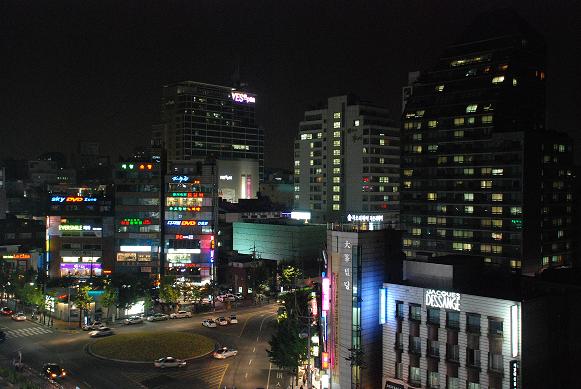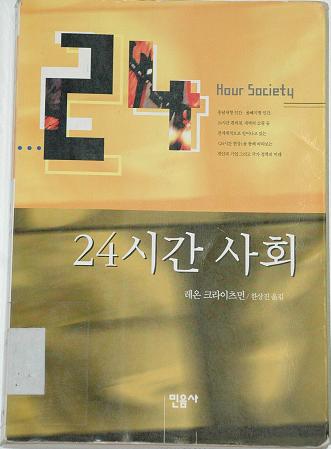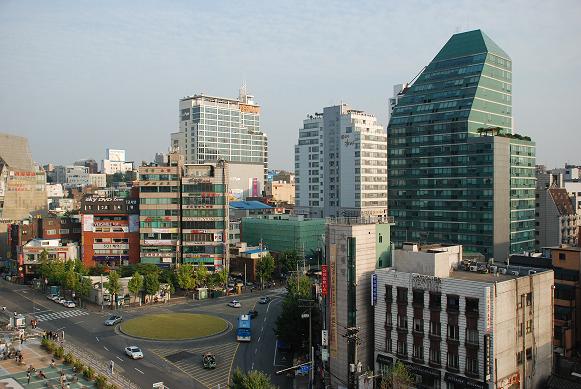 |
24-hour non-stop Korea
In 1989, 7-Eleven was the first 24-hour convenience store which opened in the Olympic Village. It expanded to 279 stores in 1992, and 7,240 stores in 2003. 7-Eleven was not the only 24-hour business that operated. Mc Donalds, Kimbabchunkuk, jjimjilbang (Korean sauna), and fitness centers also took advantage of longer hours. Now people can enjoy food, movies, and other leisure activities 24 hours a day. This kind of situation is not only limited to Seoul but is alos the norm in Busan, Daegu, Gwangju, Incheon, Bundang, and other big cities. 24-hour non-stop societies have finally become a reality. This was possible because there were both a supply and demand for a 24-hour society.
Administrative services are also following this 24-hour societal trend. In 2001, buses started to operate during late nights and people who used buses kept increasing. According to the Seoul Metropolitan Government, there were eight bus routes that operated from 12:00 a.m. to 2:30 a.m. and peopleriding those buses kept increasing. At first, there was an average of only 22 people per bus, but last year's statistics showed an increase to 40 people per bus. Therefore, the number of routes was expanded to 13. Some even insist subways should operate 24-hours.
Moreover, technological advances have freed the boundaries of both time and space in cyberspace. Many services are now available 24-hours. For example, Internet shopping malls allow people to order products anytime they want. E-mail service and chat rooms have also enabled communication to occur 24 hours a day.
The Yonsei Annals made inquiries to many research institutes to find out the exact scale of night time businesses. However, it was discovered that it is impossible to measure the scale. Samsung Economic Research Institute only assumes that the production section that occupies night time businesses is 5 to 10%. On the other hand, circulation and consumption seem to take up a much bigger part of the Korean economy. One thing for certain is that the night time economic scale and portion are increasing.
How can “time” be defined?
If people do not understand the concept of time properly they will only see the benefits of a 24-hour society. By examining the history of time, people will be able to understand the two different meanings that represent what “time” is.
Clock time, or one dimensional time, appeared during industrial society, and is based on the vibration of a metronome. This is most often referred to as the time that human beings use. With clocks, people can organize their days according to the hour. Before this classification, the only time system that people could follow was the sun.
On the other hand, event time, which is also known as natural time, is a time system that follows the human body’s physical and emotional needs. Babies are a typical example that follows event time because they eat and sleep according to their bodies' needs. However, as they grow up, they are trained to follow the one dimensional time.
As a society develops, people start to combine the two different time systems, and this is a polychromic time system. Since various time systems are applied, people have conflicts and confusion. In an industrial society, people have adapted to a dichotomous time cycle. Now, the time system is extending to a 24-hour society that values flexibility of time and holds the infinite potentiality of time.
Demand for more time: recreation of the world
The assumption that “human beings are never satisfied no matter how much they own” has been the core theory of economics. To keep making things under their possession, people needed more and more time. People now do not hesitate to say “time is money.” By understanding the history of consumption and consumer oriented society, it is obvious how the“time=money” equation is derived. Consumption is not nature’s law. When marketing and advertisement appeared in our society, people started to feel that they wanted to consume the products that were advertised, even though they did not need them. People started to want more and more property, and that is how the consumer-oriented society developed. Consumption became the main purpose of people’s lives, and people started to want more free time. However, since time is limited, the alternative was to manage the given time well.
Several factors, including time management, affected the change of the world’s time system: Deregulation of political measures; structural changes in the economy; development of new technologies, and cultural changes.
The curfew policy was eased in 1982, and in 1998 restriction of late-night activity was lifted. Before 1982, bars or taverns had to close, but after the policy was eased, night time business increased, and night streets were as bright as the daytime.
In the 90s, Korea was one of the fastest-growing nations, and consumption became as important as production. Moreover, newly-opened venture businesses worked hard to survive the competition. There was no commuting; offices became homes and leisure places for employees as they worked 24 hours non-stop.
Next, the information era came, and the Internet tied many different countries of different time zones into one place, cyberspace. In cyberspace, there are no time limits, anyone can log on and do things whenever he or she wants. Internet destroyed the preexisting time system, and it became ordinary for people to play games or chat online at late hours in cyberspace.
Dual-income families increased steadily as our society developed. However, women took on a dual burden of a career and family. It was impossible for them to have spare time or leisure. However, as the need for women to enjoy their lives increased, 24 hour businesses began to accommodate women as well. For example, now women can workout at 24 hour fitness center or go to a movie theater and enjoy a midnight movie.
The dark sides of 24-hour society
The shifting of the time system to a 24 hour society has brought many changes. These changes could be both beneficial as well as detrimental to people and our society. Since the time that people could manage increased, people had more free time to enjoy their lives. “This new lifestyle has occurred because of people’s internal needs. There are so many collisions, frictions, and conflicts in big complicated cities. However, for the people who live in them, it is hard to actually leave these cities. As a result, they try to enjoy the freedom and quietness at night. Night time is the best time to enjoy their individuality and life style for the new generation, experts, and freelancers,” said Lim Hyun-chin (Dean, Col. of Social Sciences, Seoul National Univ.)
Moreover, as time expanded, society’s productivity increased. Now people can work late hours as long as the owner of the company or individual wishes. Enterprises hire night shifts for production, and people who prefer working late hours can do so. It is also beneficial for the businesses because there are no additional costs for opening till late hours. For example, businesses do not have to pay for new buildings, rent, or equipment.
Even though there are some advantages of a 24-hour society, a dark side exists. The flood tide of materialism is a very serious problem. Our society is more a capitalistic or consumer society rather than a society where people could enjoy leisure. In a 24-hour society, we work more, spend more, and owe more. “We are now in a vicious cycle of work and consumption. In a 24-hour society, people work, earn money, and consume. However, as people consume materials, people’s desire to possess grows. They start to incur debts and to pay off the debts they have to work more,” Choe Sok-ho (Director, Seoul School of Integrated Sciences & Technologies) As mentioned previously, a 24-hour society has expanded time, and people are able to manage more time. However, people who work after midnight to maintain a 24-hour society are often more interested in sustaining their livelihood rather than self-satisfaction.
There have been numerous studies about the biorhythms of human beings by many doctors and scientists. They have claimed that those who work late at night are pushing back their bodies’ natural clock. This can be very harmful to human bodies, for the bodies are made to work during the daytime and sleep at the night. A study by the American Sleep Foundation indicates that inadequate sleep habits impair work performance and put people at increased risk for accidents, injuries, and health problems. Historically, human beings have been diurnal, not nocturnal. As a matter of fact, research has found that night owls actually had problems in secreting melatonin, a hormone, that promotes sleep. By this hormonal change, their stress or physical fatigue increase above that of average people. When the natural rhythm breaks, the immune system weakens, and the body is no longer able to fight against infections.
Time is all yours
A 24 hour society appears to be an irresistible and inevitable process in which all states and people in the world are already involved. However, even though a 24 hour society seems to be today’s general trend, there is a controversy over the concept. If the 24 hour society is turning into a materialistic society where people only exist to consume, it is not preferable. The advent of this new trend was because of human beings’ desire to manage their time flexibly. In the 24 hour society, now some people can choose to be early birds, while others can be night owls. This could be very beneficial and because it adds to productivity. All 24 hours is ours, and we should take advantage of the given time and do our best.
 |




